Why this resume works
- Quantifies accomplishments: By boosting threat detection by 45% and cutting breaches by 30%, the applicant’s numbers echo their impactful role, showing just how important it is to quantify accomplishments on your resume.
- Showcases career progression: Starting as a network security engineer and advancing to cyber security specialist, the applicant’s career path reflects growing responsibilities and expertise in safeguarding digital environments.
- Illustrates problem-solving ability: Implementing IDS systems to streamline risk assessments showcases the applicant’s knack for innovative solutions, proving they have strong problem-solving skills.
More Cyber Security Specialist Resume Examples
Take a look at these cyber security specialist resume examples to learn how to highlight your security skills, technical expertise, and risk management experience. Use these samples to help you build a resume that shows your value to employers.
Entry-level cyber security specialist
Why this resume works
- Effective use of keywords: By integrating keywords like “threat analysis” and “network security,” the applicant smartly navigates ATS filters to showcase their expertise in cyber security roles.
- Shows digital literacy: Expertise in tools like intrusion detection systems and firewall management highlights the applicant’s advanced computer skills, showing their readiness for a tech-driven workplace.
- Centers on academic background: Graduating with a master’s in cyber security from Stanford University emphasizes strong academic foundations, important for early career success in a competitive field like cyber security.
Mid-level cyber security specialist
Why this resume works
- Points to measurable outcomes: By detailing security improvements such as reducing risks by 30%, the applicant showcases an impactful approach to safeguarding digital environments effectively.
- Demonstrates language abilities: The applicant’s language skills in Spanish, German, and French gives them the ability to communicate with international teams, contributing to broader cross-cultural collaboration.
- Includes a mix of soft and hard skills: Combining data encryption expertise with leadership in audits reflects a mix of technical prowess and interpersonal skills.
Experienced cyber security specialist
Why this resume works
- Lists relevant certifications: Listing certifications like Certified Information Systems Security Professional and Certified Ethical Hacker on their resume improves their credibility, showcasing a commitment to continuous learning.
- Showcases impressive accomplishments: By developing a security protocol that reduced breaches by 45%, the applicant showcases remarkable accomplishments with tangible business impact, reflecting senior-level expertise.
- Emphasizes leadership skills: Leading a team to secure over 500 cloud assets highlights strong leadership skills, demonstrating the ability to manage and protect critical infrastructure effectively.
Cyber Security Specialist Resume Template (Text Version)
Yuki Lee
Cincinnati, OH 45203
(555)555-5555
Yuki.Lee@example.com
Professional Summary
Dynamic cyber security specialist with expertise in network security, risk management, and threat detection. Proven track record in reducing breaches and enhancing compliance protocols.
Work History
Cyber Security Specialist
CyberSafe Solutions – Cincinnati, OH
July 2024 – July 2025
- Enhanced threat detection by 45%
- Reduced breach incidents by 30%
- Managed security tools for 200 users
Information Security Analyst
TechGuard Innovations – Cleveland, OH
January 2023 – June 2024
- Streamlined risk assessments by 20%
- Implemented IDS systems across networks
- Conducted audits improving compliance
Network Security Engineer
SecureNet Systems – Cleveland, OH
July 2021 – December 2022
- Increased firewall efficiency by 35%
- Detected vulnerabilities in real-time
- Trained staff on secure protocols
Skills
- Threat Analysis
- Network Security
- Compliance Auditing
- Intrusion Detection Systems
- Risk Management
- Security Protocols
- Firewall Configuration
- Vulnerability Assessment
Certifications
- Certified Information Systems Security Professional – ISC2
- Certified Ethical Hacker – ECCouncil
Education
Master of Science Cyber Security
Stanford University Stanford, CA
December 2020
Bachelor of Science Computer Science
University of California, Berkeley Berkeley, CA
December 2018
Languages
- Spanish – Beginner (A1)
- Chinese – Intermediate (B1)
- French – Beginner (A1)
Related Resume Guides
- Data Management Trainee
- Database Administrator
- Database Developer
- Enterprise Resource Planning Consultant
- GIS Analyst
- Information Security Manager
- MIS Executive
- Network Administrator
- Salesforce Administrator
- Salesforce Developer
- SAP Basis Consultant
- Solutions Architect
- Technical Business Analyst
- Telecom Project Manager
Advice for Writing Your Cyber Security Specialist Resume
Dive into our tips on how to write a resume for a cyber security specialist role and discover how to highlight your tech skills, problem-solving ability, and passion for keeping data safe.

Highlight relevant technical skills
A cyber security specialist needs strong technical skills to protect computer systems and networks from attacks. It’s smart to include a “Technical Skills” section in your resume so employers can quickly see what you can do. If these skills are part of your work experience, mention them there too, but ensure they’re easy to spot.
Common technical skills for a cyber security specialist include:
- Knowledge of network security, firewalls, and encryption methods
- Familiarity with operating systems like Windows, Linux, and macOS
- Coding languages such as Python or JavaScript
- Building secure applications and automating tasks
- Understanding malware analysis tools and penetration testing techniques
- Finding system vulnerabilities
When writing about your technical skills, consider what the employer needs most by checking the job description closely. Tailor your list accordingly to demonstrate that you have the skills necessary to keep data safe from hackers and other threats.
Example of a technical skills section
- Network security and intrusion detection systems (IDS/IPS)
- Firewall configuration and management (Palo Alto, Cisco ASA, Check Point)
- Security information and event management (SIEM) tools (Splunk, QRadar)
- Penetration testing and vulnerability assessment tools (Nmap, Metasploit, Nessus)
- Encryption protocols and cryptographic standards (TLS/SSL, AES, RSA)
- Endpoint protection platforms (CrowdStrike, Symantec, McAfee)
- Cloud security frameworks and tools (AWS Security Hub, Microsoft Azure Sentinel)
- Incident response strategies and procedures
- Secure software development practices
- Operating system hardening techniques
Employers want more than technical know-how. Highlight soft skills like teamwork and communication to show you’re a great team player.
Quantify your accomplishments
Quantifying accomplishments in a resume makes it stand out because it shows exactly what you’ve achieved, not just what you’ve done. As a cyber security specialist, instead of saying you “monitored systems,” explain how you “reduced system vulnerabilities by 30% through regular monitoring and updates.”
This approach helps hiring managers see the real impact of your work quickly. In the work experience section, each entry should start with your job title, then the employer name, location, and dates you worked there. After that, focus on turning duties into achievements using measurable results like percentages or time savings.
Using action verbs and numbers turns your resume into a story of success rather than a list of tasks. For example, saying you “implemented security protocols” becomes more powerful when you add that this “cut unauthorized access attempts by 40%.” These specifics make your resume results-driven and engaging.
Quantified accomplishments help show off your skills and impact at a glance to employers looking for someone who can deliver proven results. By highlighting these achievements clearly, you’ll make it easier for hiring managers to understand the value you bring as a cyber security specialist.
5 cyber security specialist work history bullet point examples
- Implemented advanced threat detection systems, decreasing security breaches by 40% within the first year.
- Conducted regular vulnerability assessments and penetration testing, identifying and mitigating 95% of potential threats.
- Developed and enforced security policies across the organization, resulting in a 50% reduction in unauthorized access incidents.
- Collaborated with IT teams to successfully deploy encryption protocols, safeguarding sensitive data for over 1,000 users.
- Trained 200+ employees on cyber security best practices, significantly reducing phishing attack success rates by 60%.
Need help making your resume stand out? Check out our professional resume examples to see how you can make your skills and experience shine.
Write a powerful professional summary
A professional summary is a brief section at the top of your resume. It introduces you to hiring managers and gives them a quick view of who you are as a worker. When deciding between a summary or an objective, think about what best shows your strengths and career goals.
A professional summary is usually three to four sentences long and highlights your experience, skills, and achievements. It’s best for those with some work experience because it showcases what you’ve done and how valuable you can be to a new employer. The purpose is to show your professional identity and the value you bring.
On the other hand, a resume objective states your career goals. It’s great for entry-level workers, career changers, or people with gaps in their work history. While a summary says “what I’ve accomplished,” an objective focuses on “what I aim to contribute.”
Next, we’ll provide examples of both summaries and objectives for different industries and experience levels, including roles like cyber security specialist.
Cyber security specialist resume summary examples
Entry-level
Recent computer science graduate with a focus on cyber security from a top-ranked university. Holds CompTIA Security+ certification and possesses foundational skills in network security, threat analysis, and vulnerability assessment. Experienced in academic projects involving penetration testing and risk management. Eager to contribute to safeguarding digital environments and supporting teams in complex security challenges.
Mid-career
Cyber security specialist with over seven years of experience in protecting enterprise networks and systems. Demonstrates expertise in incident response, firewall configuration, and intrusion detection systems. CISSP certified professional known for successfully managing security audits and implementing robust data protection strategies. Proven track record of reducing cyber threats through proactive monitoring and threat intelligence.
Experienced
Seasoned cyber security expert specializing in strategic leadership and advanced threat mitigation strategies. Brings over 15 years of experience leading cross-functional teams to safeguard critical infrastructure against sophisticated attacks. Holds multiple certifications including CISM and CEH, with a history of improving organizational resilience through comprehensive risk assessments and innovative technology solutions. Committed to fostering a culture of security awareness across all levels of the organization.
Cyber security specialist resume objective examples
Recent graduate
Driven and detail-oriented recent graduate with a bachelor’s degree in cyber security, aiming for an entry-level cyber security specialist role to use foundational knowledge of network defense and risk assessment techniques. Committed to contributing to organizational security efforts while expanding expertise in threat mitigation.
Career changer
Adaptable professional transitioning into cyber security, leveraging transferable skills in problem-solving and data analysis from prior roles. Seeking a cyber security specialist position to apply newly acquired technical skills such as vulnerability scanning and incident response, while fostering a secure digital environment.
Specialized training
Aspiring cyber security specialist with hands-on experience from industry certifications like CompTIA Security+ and practical coursework in ethical hacking. Looking to join a forward-thinking organization where analytical abilities and understanding of intrusion detection systems can support proactive defense strategies.
Opt for a neat resume template with clear sections to simplify reading. Avoid fancy fonts or busy graphics that may obscure your skills and experience.
Showcase your credentials
Listing certifications is important for a cyber security specialist because they show you have the right skills and knowledge. Certifications, licenses, and specialized training prove that you understand complex systems and can protect them from threats.
In technical fields like cyber security, having these credentials can make a big difference in getting hired. Creating a dedicated “Certifications” section on your resume helps employers quickly see your qualifications.
Here are some certifications commonly found on cyber security specialist resumes:
- AWS Certified Solutions Architect
- Google Professional Cloud Engineer
- Microsoft Certified: Azure Solutions Architect Expert
- Certified Kubernetes Administrator (CKA)
- CompTIA Security+
Adding certifications alongside your education section shows that you’re committed to staying current in your field. These credentials help you stand out as someone who knows how to handle real-world security challenges. They also show employers that you’re ready to protect their data effectively.
Example of a certifications section
Certified Information Systems Security Professional (CISSP)
Issued by: International Information System Security Certification Consortium (ISC)²
Expires 2025
Certified Ethical Hacker (CEH)
Issued by: EC-Council
Issued 2022
CompTIA Security+
Issued by: CompTIA
Expires 2027
GIAC Security Essentials Certification (GSEC)
Issued by: Global Information Assurance Certification (GIAC)
Issued 2021
Cisco Certified CyberOps Associate
Issued by: Cisco Systems
Expires 2026
Include either the issue date or expiration date of each of your certifications and licenses to show that your credentials are current.
FAQ
Do I need to include a cover letter with my cyber security specialist resume?
Yes, adding a cover letter to your cyber security specialist resume can definitely give you an edge.
A cover letter generator helps you explain why you’re passionate about the role and how your specific skills can benefit the company.
Highlighting projects where you’ve improved security measures or prevented breaches can make your application stand out.
For instance, if the company deals with a particular technology or industry, mention any relevant experience you have in that area.
You might also want to discuss any certifications or ongoing education efforts that show you’re staying current in the fast-evolving field of cyber security.
Finally, keep it concise and focused on how you can solve their security challenges.
Check out some cover letter examples for inspiration.
How long should a cyber security specialist’s resume be?
A cyber security specialist’s resume should ideally be a one-page resume, especially in the early stages of your career. Highlight key skills like threat detection, network security, and incident response.
But if you have extensive experience or multiple certifications, a two-page resume is okay. Every detail should be relevant to the role and show your expertise in securing systems and data.
Focus on recent accomplishments and projects that showcase your impact in cyber security. For more tips on determining how long a resume should be, explore our guide.
How do you write a cyber security specialist resume with no experience?
If you’re trying to create a cyber security specialist resume and don’t have experience, emphasize your skills, education, and any relevant projects or training that highlight your potential in this field. Check out these tips to write an engaging resume with no experience.
- Highlight your education: List your degree in computer science, information technology, or a related field at the top. Mention any relevant coursework like network security or ethical hacking.
- Showcase certifications: Include any cyber security certifications you’ve earned such as CompTIA Security+, CEH (Certified Ethical Hacker), or CISSP (Certified Information Systems Security Professional).
- Emphasize technical skills: Highlight programming languages (such as Python or Java), tools (like Wireshark or Metasploit), and operating systems you are proficient with. These are important for cyber security roles.
- Include personal projects: Detail any cyber security projects you’ve worked on independently, whether it’s setting up a home lab to practice penetration testing or contributing to open-source security software.
- Mention soft skills: Communication, problem-solving, and analytical thinking are key in cyber security. Provide examples of how you’ve demonstrated these abilities.
Consider using our detailed guide on crafting resumes for beginners to find more tips and examples tailored to entry-level positions.
Rate this article
Cyber Security Specialist
Additional Resources
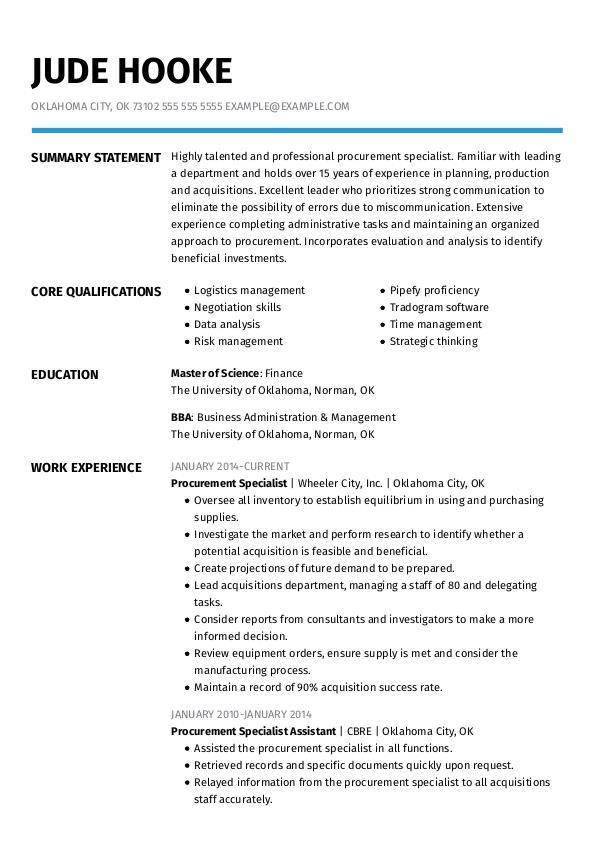
Procurement specialist Resume Guide + Tips + Example
Propel your career with an effective procurement specialist Resume. We have created the perfect guide to help you create a professional procurement specialist Resume, with tips on what to add,
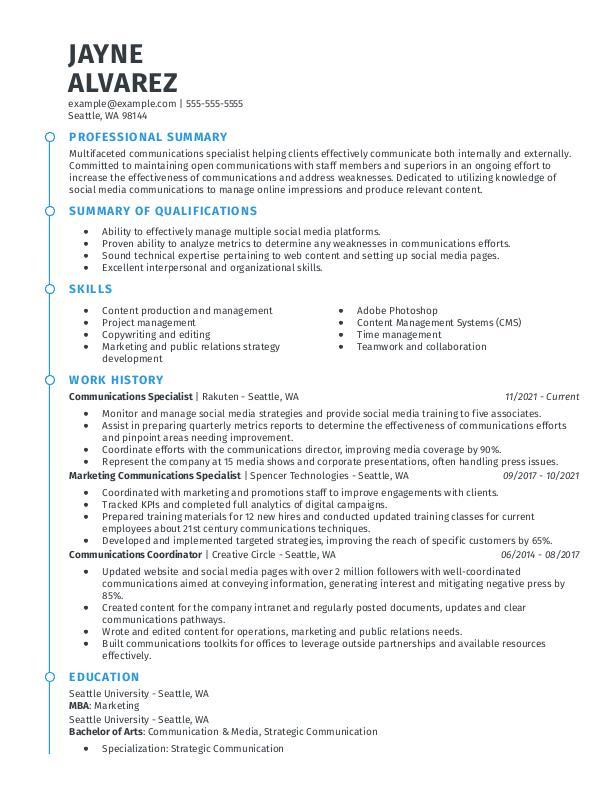
Communications Specialist Resume Examples & Templates
Communication specialists are critical to any organization and are crucial in ensuring an effective communication strategy to build a brand. With our expertly crafted communications specialist resume samples and pro tips,
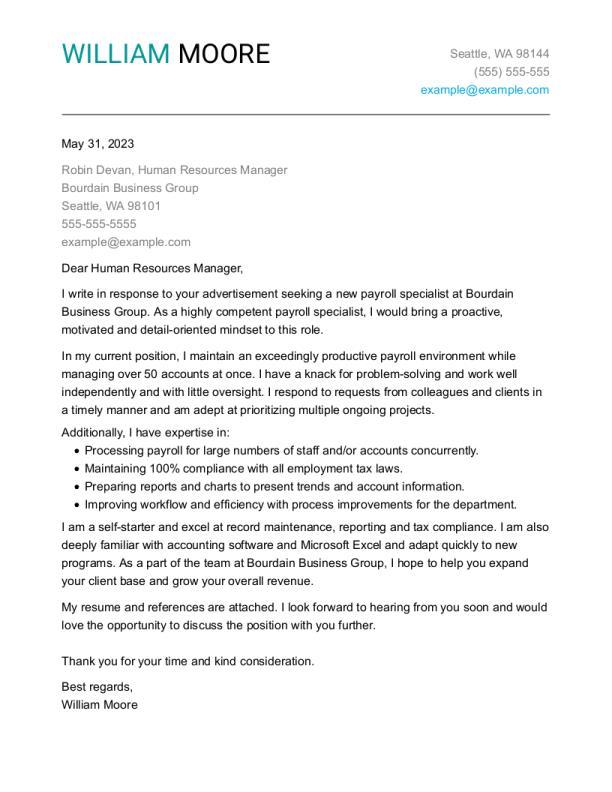
Payroll Specialist Cover Letter Examples & Templates
A well-written resume can only take you so far. To truly stand out, complement it with a strong cover letter. Typically, a cover letter includes an introduction, a few body
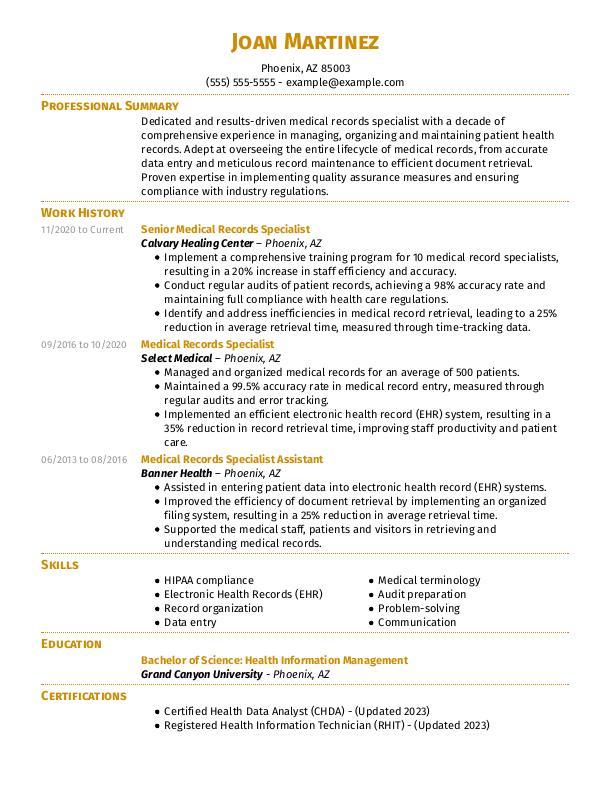
Medical Records Specialist Resume Examples & Templates
Medical records specialists, sometimes called medical records technicians, are highly trained professionals responsible for the accurate and secure management of medical records. They’re responsible for ensuring the accuracy, integrity and
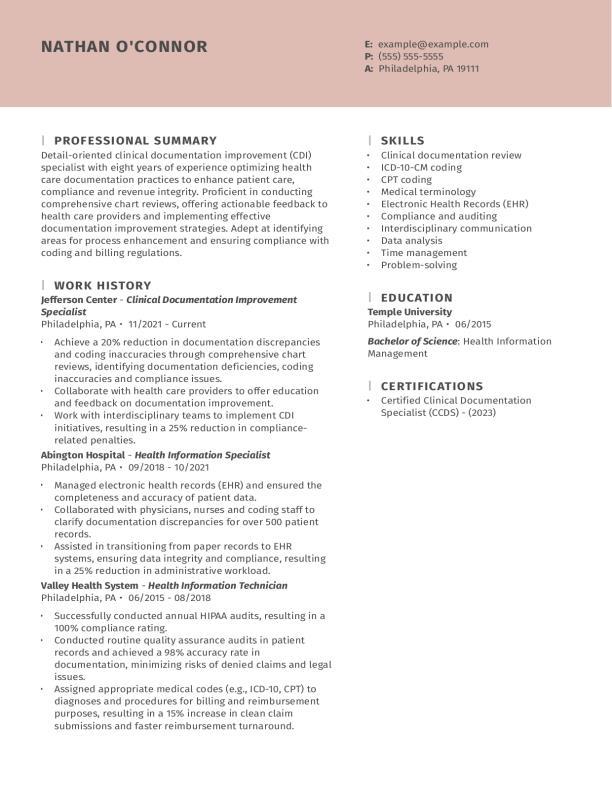
Documentation Improvement Specialist Resume Examples & Templates
Clinical documentation improvement specialists organize medical information from patients and physicians. Your expertise in documentation, medical coding, data quality and data collection help physicians and medical institutions improve their services. Advance
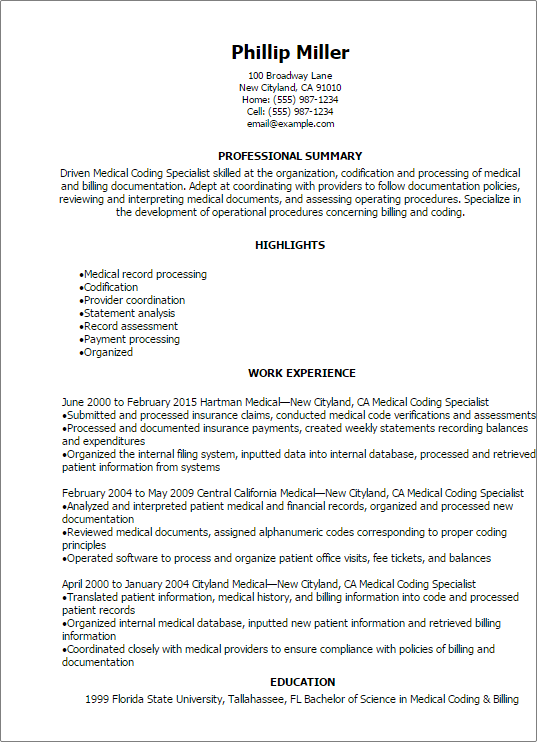
Medical Coding Specialist Resume Examples & Templates
You need a great resume if you want a job as a medical coding specialist and we’re here to help you build one. Our guide to crafting an effective resume
